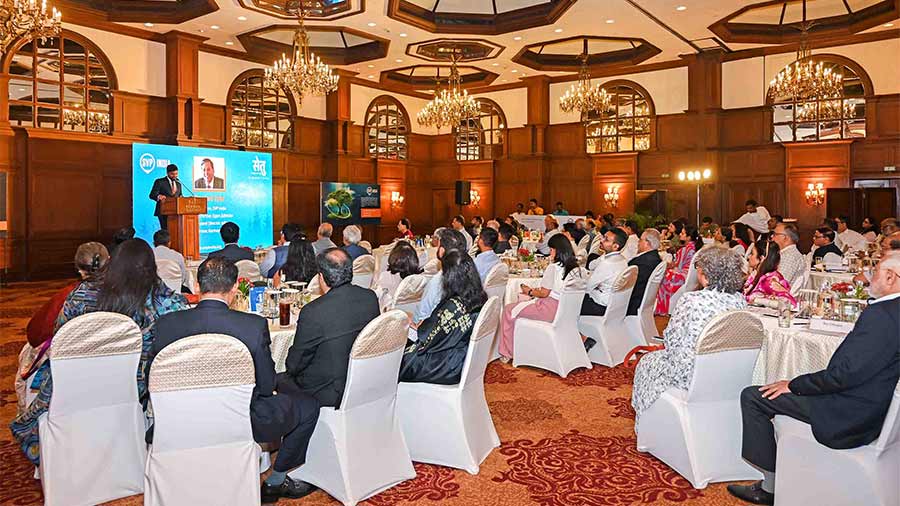On October 6, Social Venture Partners (SVP) India, one of the country’s largest platforms for engaged philanthropy, hosted ‘Setu’, an annual fundraising event at a city hotel.
SVP seeks to provide a platform for individuals to actively engage in philanthropy by not only providing financial support to NGOs but by also contributing their skills and expertise to help the non-profits grow. In Kolkata, SVP has worked with 14 non-profits and currently supports 10. For ‘Setu’, SVP presented four non-profit organisations namely, Vihaan, Vaani Deaf Children’s Foundation, Calcutta Foundation and Help Us Help Them.
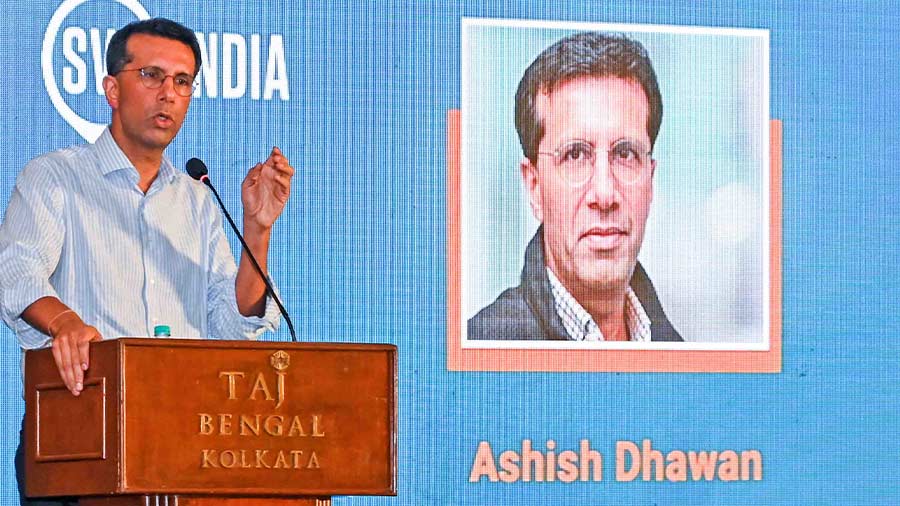
Ashish Dhawan, founder and CEO, The Convergence Foundation and chairperson, Ashoka University
The chief guests of the session were Ashish Dhawan, founder and chief executive officer of The Convergence Foundation, chairperson of Ashoka University, and founder of ChrysCapital; Govind Iyer, SVP India chairperson and Ravindra Chamaria, chapter mentor, SVP India, Kolkata.
“For me, SVP has redefined my purpose in life. It was in 2012 when the founder of SVP, Ravi Venkatesan called me up and asked if I could join the board. It has been a fabulous journey of 11 years since seeing us in eight different cities, Kolkata being one of the cities where we have grown the most with the tremendous support of Sunil Bhandari our chapter chairperson and Snigdha Shah, who is the CEO, SVP India - Kolkata. All of us are gathered here as partners of SVP. What SVP does is that it allows us to come together and choose how we engage with philanthropy,” said Govind Iyer, before the presentations by the four NGOs commenced.
Differently abled children can live with dignity
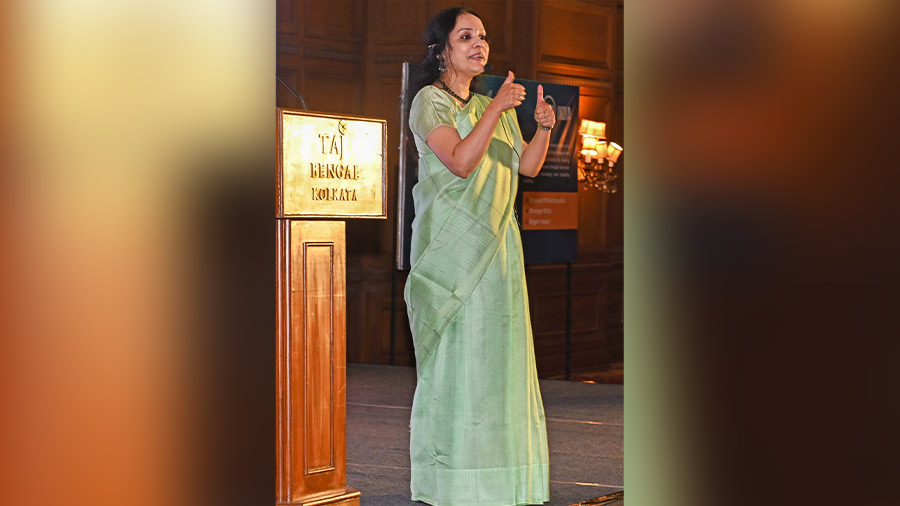
Sumedha Joglekar, executive director, Vaani, delivers her presentation
The first presentation of the evening was by Sumedha Joglekar, the executive director of Vaani Deaf Children’s Foundation. Founded in 2005, the NGO focuses on issues related to childhood deafness. “We work on early childhood deafness and our main focus is working with parents because we have found that a huge communication exists between the parents and their hearing-impaired children. Bridging that communication gap is what Vaani does. What my experience with the foundation has been is that I have always been a teacher of the deaf. I am the executive director now so I take care of the overall functioning of the team of 65 people. This is a beautiful organisation and we work on inclusion so that all differently abled children can live with dignity,” said Joglekar. In its 18 years of existence, the NGO has positively impacted the lives of over 1,00,000 people and has spread in multiple regions including Meghalaya, Jharkhand, Odisha, West Bengal and Assam among others.
Saves lives, breaks cycle of crime
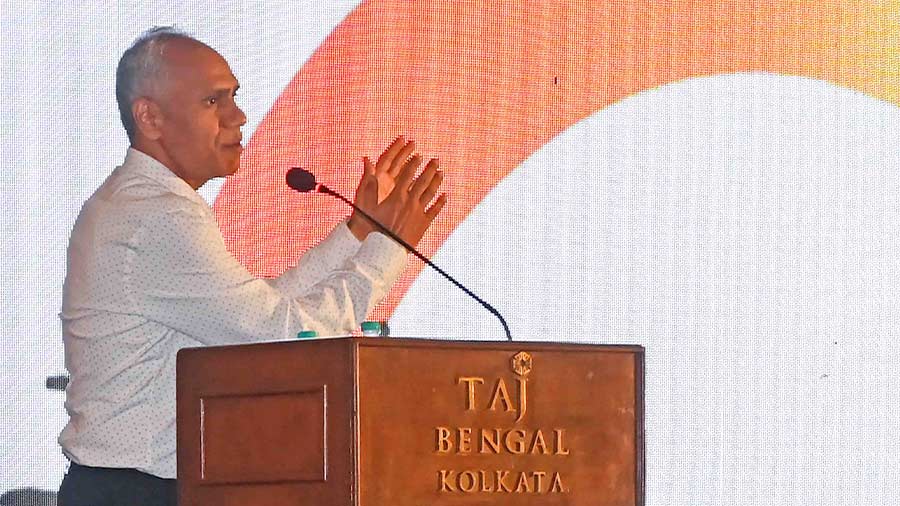
Samir Baptist, CEO, Vihaan
Vihaan, an NGO, working with the victims of sexual abuse and exploitation, bonded, child labour, domestic servitude and beggary, followed up next. It aims at the protection of vulnerable women and children. “Vihaan is a Sanskrit word meaning the first rays of the morning sun bringing hope. Vihaan not only saves lives but also aims to break the cycle of crime. Because of poverty, lack of economic activities, sometimes parents and husbands and even brothers sell women off to traffickers. A vulnerable group are the girls who drop out of school after Class VIII because education is free till then. There is very low awareness in the communities and this is a profitable business for traffickers where one girl gives a profit of Rs 1.5 lakh per month. In absolute numbers, 25 lakh girls are in situations of exploitation. In a recent study done by India Today, there was a 600 per cent spike because of Covid-induced lockdowns,” said Samir Baptist, CEO of Vihaan. Since its inception over a decade ago, the NGO has established offices in key cities such as Mumbai, Bengaluru, Delhi and Kolkata. To date, it has rescued close to 5,000 victims of trafficking and sexual exploitation and supported more than 300 survivors to craft a better future for themselves.
Creating spaces for women and bring them 360-degree support
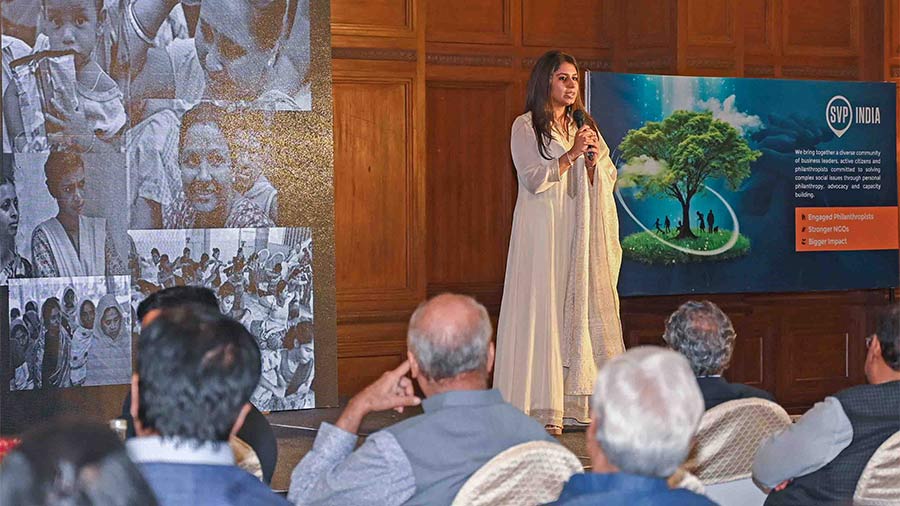
Mahim Varma, co-director, Calcutta Foundation, during her presentation
The penultimate presentation of the evening was by Mahima Varma, co-director of Calcutta Foundation. A 29-year-old organisation, the NGO focuses on empowering women towards financial independence through skilling, personal development and community building.
“The foundation was started almost three decades ago by my grandmother Shamlu Dudeja and today my sister and I have taken a very different approach where we redefine skills development for women in rural India. The way that we look at it is that we are creating spaces for our women in their communities to bring 360-degree support to them. We help them learn a skill and then we help them get placed within organisations. We bring workshops, mental health counselling, and mentorships to the centres so that they are exposed to new things that don’t exist in their immediate environment. When we started in 2021, Covid had just happened and there was a huge disconnect in rural areas. That led us to building this programme so that we can bring to women these opportunities,” said Varma.
Its flagship programme, ‘Apni Kutir’, offers vocational training in tailoring, beauty, digital literacy, and nursing-aide. In rural India, ‘Apni Kutir’ serves as a holistic solution, helping women gain economic power and financial autonomy.
Reconstructing rural India
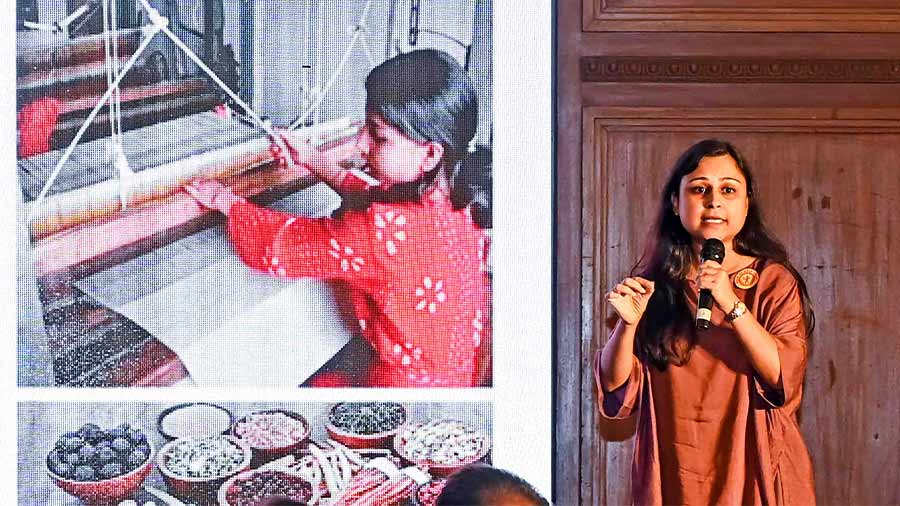
Mukti Gupta, founder president, Help Us Help Them, during her presentation
The last presentation of the evening was by Mukti Gupta, founder-director of Help Us Help Them. Founded in 2006, the NGO focuses on education and holistic development for underprivileged children. They have enrolled approximately 3,800 first-generation learners and run two projects — rural school at Mallikpur and School-On-Wheels with 35 faculty members and 600 students. Their upcoming project is Adhigam Bhoomi - ‘Apni Mitti Se Judi Shiksha’ — a free residential learning centre for 1,000 girls in the age group of 6-16 years.
Explaining the rationale behind the NGO, Gupta pointed out that they believe that simply providing education is not enough, the focus should be on meaningful education. “We have found out that the real reason why the underprivileged section in India is increasing is because of rural-to-urban migration. We want to redefine education for rural India. So apart from mainstream subjects, we have subjects like Ayurveda, pottery, agriculture, and textile to make rural India economically self-reliant. A proper curriculum from classes one to tenth has been developed by 30 educational scientists which we want to implement not just in our schools but also in schools all over India with the help of the government,” she said.
Their vision is to reconstruct rural India through education.
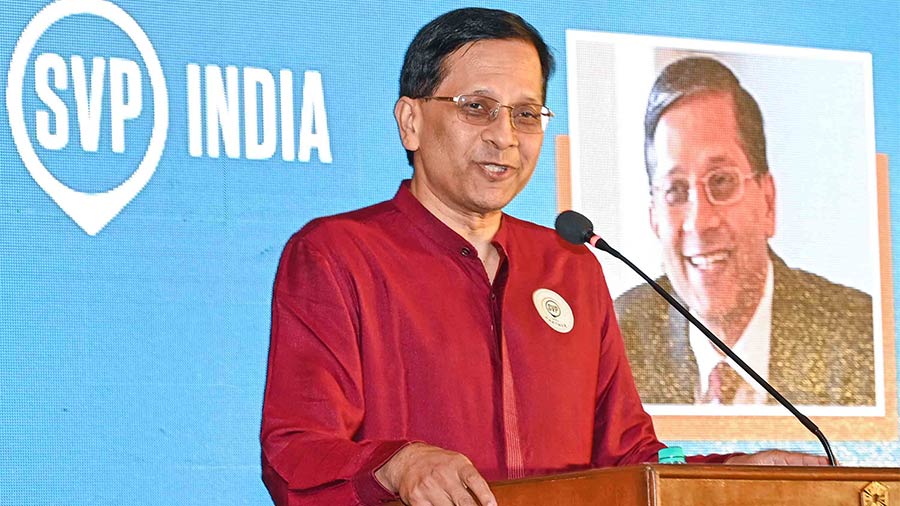
Govind Iyer, SVP India chairperson
The presentations were followed by an address by Ashish Dhawan where he said that philanthropists should “give sooner, give more and give better”. The evening concluded with the fundraiser where the NGOs raised 6.12 crores cumulatively.
“We envisioned ‘Setu’ to be a unique event and it was exactly so. We were greatly inspired by extraordinary stories of change and resilience, touching our hearts and minds. Philanthropy is both a mind-set and a heartfelt decision, and we aspired for this event to beautifully exemplify this essence which it did,” said Sunil Bhandari, chapter chairperson, SVP.
